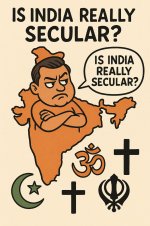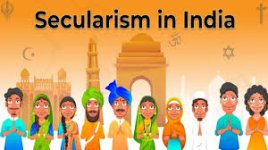India is often celebrated as the world’s largest democracy and a vibrant melting pot of cultures, religions, and traditions. The Indian Constitution declares the nation to be secular, promising equal respect and treatment to all religions. But in recent years, questions have emerged: Is India truly secular in practice? Or is secularism an ideal that faces challenges on the ground?
Understanding Secularism in the Indian Context
Unlike the strict separation of religion and state seen in some Western countries, Indian secularism is unique. It aims to ensure equal treatment of all religions rather than complete separation. The state neither promotes nor discriminates against any religion and strives to protect religious freedom.
This model is deeply rooted in India’s diverse society, with significant populations of Hindus, Muslims, Christians, Sikhs, Buddhists, Jains, and others coexisting for centuries.
Challenges to Secularism: Political and Social Realities
Despite constitutional guarantees, secularism in India faces multiple challenges:
At the same time, India has many examples where secularism thrives:
The question of whether India is really secular doesn’t have a simple yes or no answer. India’s secularism is a work in progress, constantly tested by social, political, and economic forces.
Sustaining secularism requires:
India’s secularism is both its strength and its challenge. As a nation, embracing diversity while striving for unity is a delicate balancing act. Recognizing and addressing the complexities honestly is essential for India’s democratic and social fabric to flourish.
Understanding Secularism in the Indian Context
Unlike the strict separation of religion and state seen in some Western countries, Indian secularism is unique. It aims to ensure equal treatment of all religions rather than complete separation. The state neither promotes nor discriminates against any religion and strives to protect religious freedom.
This model is deeply rooted in India’s diverse society, with significant populations of Hindus, Muslims, Christians, Sikhs, Buddhists, Jains, and others coexisting for centuries.
Challenges to Secularism: Political and Social Realities
Despite constitutional guarantees, secularism in India faces multiple challenges:
- Political Mobilization on Religious Lines
Politics in India has sometimes used religion as a tool to garner votes. Political parties and groups may appeal to religious identities, which can deepen divisions and communal tensions. - Communal Violence and Social Polarization
Periodic outbreaks of communal violence have threatened social harmony. These conflicts raise questions about the state’s ability to protect minorities and uphold secular principles impartially. - Legislative and Policy Debates
Laws such as Personal Laws based on religion, or debates over religious conversions and cow protection, complicate the secular framework. Critics argue these issues can sometimes blur the line between religion and governance. - Media and Public Discourse
Sensationalism and misinformation in media can amplify religious divides, influencing public opinion and political narratives.
At the same time, India has many examples where secularism thrives:
- Religious festivals of different communities are celebrated nationwide with equal enthusiasm.
- Courts have often intervened to protect minority rights.
- Educational institutions, public services, and government jobs are designed to be accessible to all, regardless of religion.
The question of whether India is really secular doesn’t have a simple yes or no answer. India’s secularism is a work in progress, constantly tested by social, political, and economic forces.
Sustaining secularism requires:
- Strengthening institutions that uphold constitutional rights.
- Promoting inclusive political discourse.
- Encouraging interfaith dialogue and education.
- Holding media accountable for responsible reporting.
India’s secularism is both its strength and its challenge. As a nation, embracing diversity while striving for unity is a delicate balancing act. Recognizing and addressing the complexities honestly is essential for India’s democratic and social fabric to flourish.



